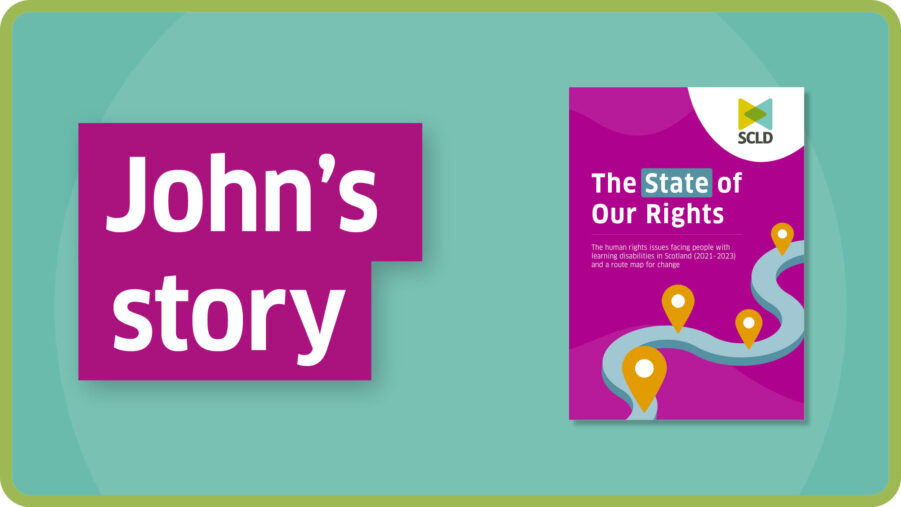
John’s story
“My name is John. I grew up in the Royal Scottish National Hospital (RSNH) when I was a wee tot. I don’t remember my life before that. I went in there when I was about two or three years old. They put me in the hospital because they said I had epilepsy and I was having fits, but I don’t remember if I ever had fits.
The juvenile hospital I grew up in was big. More than 100 people were living in it. It was noisy. The wards in the hospital were all named after Scottish islands, like Uist, Mull and Iona. It was all different weans in the hospital, some who didn’t need that much help and some who needed a lot of help. We all kept to ourselves, the staff talked to the staff, and the patients spoke to one another. Nobody ever asked how you were feeling.
We slept in big wards with all the beds lined up back-to-back; we had wee lockers you could put your stuff in. But none of us really had anything like toys or anything like that. If we did have anything, it wouldnae last long; someone would break it.
None of us had our own clothes. We had wee hospital uniforms, but they didnae belong to us. The staff would just decide in the morning what would roughly fit each of us, and that would be it. I remember the shirts had RSNH stamped on them in red with dots, and our shoes had them on the soles as well. If we went out on day trips, we would try to cover the RSNH logo up. We didnae want people to see that.
Occasionally we would go out on wee trips to the football, or I would go swimming at Polmont Borstal. I remember I used to see the man mopping the floor there. But most of the time, we couldn’t do what we wanted. We mainly sat in the parlour in the daytime, twiddling our thumbs. We just did what we were telt to. You get institutionalised.
We did have school, and we did basic reading and writing, but that never really worked. Occasionally one of the teachers brought in soft toys, and we could draw them. I quite liked that. When I was a bit older, 14 or 15, I moved to another hospital called ‘The Colony’. It had big cast iron baths, and the staff would come in and watch you take a bath and get dressed. It wisnae very dignified. I had a friend in that hospital; he used to play the chanter in the bathroom.
Sometimes in the hospitals, I would help the staff make the beds. A few people had wee jobs like cutting the hedges or cleaning. You could earn like £1 or £2, but no much, just pocket money to buy sweeties or a packet of cigs from the hospital tuck shop. Better than nothing.
I never knew my family growing up; I never really had many visitors in the hospitals I lived in. When I was growing up, I never knew when my birthday was, and for many years didn’t even know it had passed. Sometimes, if a staff member at the hospital noticed it was my birthday, they might give me a card, but that didnae always happen.
I never really got many Christmas presents as a kid; one year, the hospital gave me a glass wae Tom and Jerry on it, and another year I got a black and white polaroid camera. Later on, another patient gave me a colour polaroid camera, but that was it.
Now I love photography; I take photos all the time. I keep them all in my house now in albums or Jacob’s cracker tins. I probably still have the photos I took in the hospital on the black-and-white camera, but I’d need to dig them out.
In the past, I could be a bit of an angry young man at times, but the staff in the hospital would really wind up the patients. I was restless, so the staff gave me a lot of tablets. If I had been a ‘bad boy’, I would be sent to see the doctor, who would give me more tablets.
I was on a lot of tablets. I was on phenobarbital for a long time, but I don’t take any tablets any more. The tablets would come around in the dining room at mealtimes on a big silver trolley with the food. The food was alright, usually cold or lukewarm. I’m no a fussy eater.
After about 20 years, I got out of the hospital. I moved into a group home with three other people. I needed that then, but I didnae really like the people I lived with, personality clashes, you know? I guess that’s what happens when you don’t pick the people you live with.
I did make some friends from other places. During the day, I would go to a day centre where we would do chair weaving, but it was busy and noisy. Occasionally I would see the minister from the hospital, I went around and did his garden, and sometimes we would play badminton. We would run about like hooligans; it was like sword fighting. I was doing a lot of gardening for a while, one woman whose garden I did worked me hard but always gave me a wee brandy, sherry or whisky when I finished. I still do a bit or gardening, but I’m no taking on any more right now.
Eventually, I got into my own house; it’s got two bedrooms and is filled with my artwork, photos and DVDs. I have photos of my friends on the fireplace.
I got involved with the art project cause I’ve always liked art since I was a youngster. I’ve been with that project for a long time now. I work in all art forms like ceramics, tapestry, lino cutting, watercolour, papier-mâché, everything really. My least favourite is probably acrylic. I have had a load of exhibitions, between 40 and 50 of them. Some of my favourites were the ones I did, where I painted on a gallery wall to illustrate a road trip. I’ve had exhibitions all around the world. I like what I do and think I’m alright at it. The National Galleries of Scotland recently bought a collection of my work.
I see my family sometimes now. My mum used to be a painter, and my dad used to be an engineer; I think I maybe get some of my artistic traits and problem-solving skills from them. I found out when I was around 40 years old I had a sister, the Salvation Army Tracing Service contacted me and said, “Do you want to meet your sister? I just said, “Aye”, right away. I was glad to see her. I don’t see her as much as I would like now, though.
When I think back on my life and what I would want to see different for people now, I would say we need the government to try and improve people’s lives, no put people in institutions. I never thought I’d be where I am now; when I lived in the hospital, I used tae think, I’ll be 10 foot in a wooden box before I get out a here. I’m going to die in here.”


